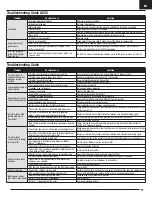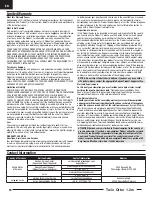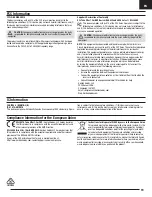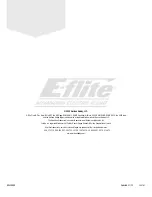
EN
Float Assembly and Installation
1. Remove the screw on the bottom of the fuselage, and remove the landing gear
cover.
2. Loosen the nose wheel assembly screw, and remove the nose wheel assembly
from the nose wheel steering bracket.
3. Loosen the six 2mm x 10mm mounting screws from the landing gear mounting
clamps. Remove the mounting clamps (screws attached) and set them aside.
4. Install the front and rear float struts in the fuselage. The float struts angle down at
the ends; the wheel strut is straight out, away from the plane.
5. Reinstall the landing gear cover and tighten the fuselage screw.
6. Install the floats and the spreader bars onto the struts, using the plastic clamps and
the 2mm x 10mm screws to secure each clamp.
7. Install the steering wire, slipping the z-bend into the steering arm and snapping the
rear clip into the water rudder clevis.
8. Secure the pushrod sleeve to the rear spreader bar with the included zip tie.
Tip:
If you removed the steering arm for the water rudder for flying with wheels,
reinstall it for flying with floats.
Disassemble in reverse order.
NOTICE:
If installing floats, always recheck the center of gravity before
attempting to fly. Failure to do so may result in a crash.
14
Twin Otter 1.2m
Flying off water poses a higher risk because piloting errors or water conditions
can cause the aircraft to become stranded. Only fly from the water when a level of
comfort has been achieved flying the aircraft from the ground.
Pre-Flight
Ensure the optional floats are secure on the fuselage and the water rudder is correctly
connected and operating with the main rudder before putting the aircraft in the water.
Select an area to fly that does not have water currents, salt water, or debris. Look around
the flight area and be aware of trees, docks, buoys, or other obstacles. Always fly with a
spotter and avoid swimmers, boaters, people fishing, and people on the beach.
Taxiing
When taxiing, use low throttle settings and the rudders to steer. Hold up elevator to
help keep the rudder in the water and the nose of the floats above the surface. Steer
into the wind when turning, and crab into the wind if crosswind taxiing is required.
When turning or crabbing into the wind, apply aileron against the wind to keep the
upwind side of the wing down and prevent the aircraft from being flipped over. Do not
apply down elevator when the airplane is taxiing or during the takeoff run.
On Step
When speed increases with throttle, the floats will rise out of the water and begin
to plane on the surface of the water, riding “on step.” The floats will come on step
at a speed below flight speed, this is a transitional phase when the aircraft is not
up to flight speed yet. This is considered a high speed taxi. Do not attempt to take
off as soon as the aircraft comes on step. Use low to medium throttle and hold up
elevator to manage speed on the water during a high speed taxi.
Takeoff
To lift off from the water, set the flaps to the takeoff position, hold up elevator and
accelerate the aircraft to bring it on step. Relax the up elevator as the airplane comes
on step and accelerate to flight speed with full throttle. When the aircraft is travelling
at a sufficient speed, pull back slightly on the elevator to rotate for liftoff.
Landing
To land on the water, set the flaps to the landing position, and fly into the wind.
Reduce the throttle to a low setting but keep some power during the approach. As
the aircraft settles into ground effect, reduce the throttle fully and hold up elevator
to flare. Hold up elevator through the touch down and as the airplane decelerates
on the water.
WARNING:
Never attempt to retrieve a downed aircraft by swimming
unless you are sufficiently trained and/or there is another person available
to respond in the case of an emergency.
CAUTION:
Have a plan for retrieval in the event the airplane becomes
stranded. Never retrieve a downed model in the water alone.
CAUTION:
If at any time water splashes in the fuselage while flying from
water, bring the airplane to shore, open the battery hatch and immediately
remove any water that may have gotten in the fuselage. Leave the battery hatch
open overnight to let the inside dry out and to prevent moisture damage to the
electronic components. Failure to do so could cause the electronic components
to fail, which could result in a crash.
TIP:
Use a fishing pole with heavy line as a retrieval tool. Attach a tennis ball to the
line, and throw the ball past a stranded aircraft to retrieve it.
Flying Off Water






































